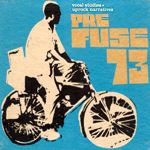 |
 |
|
|
|
| |||
 Prefuse 73
Prefuse 73Vocal Studies + Uprock Narratives [Warp] Rating: 8.7 Forget subculture, hip-hop is its own nation now. And to those who say it's the new rock and roll, at least compared to the spineless alternadultery on the radio these days, I concur. The hip-hop artist is best posed for stardom right now, free to be the mouthpiece of a community or the avatar of a corporate brand. What really blows me away is that now the rock comes to the rap. Jimmy Page and Dave Navarro are Bad Boy Entertainment bitches! Like the nation from which it rises, though, hip-hop has a divisive population. Back in the 80's, artists had to stick together to defend against Tipper and the righteous crusade to save America from horny skits and prankster MCs. But the scene grew larger, and then the danger came from within: first from gangster rap's revision of the civil war, east coast to west, then from the luster of the Cristal-slinging bling-bling. Now, a new threat has come to town. Who is this disrespectful outlaw? One man and his instrumental hip-hop album. At least you'd think so, from the biters on the message boards dissing this guy before they've even listened to the album. Prefuse 73 is Atlanta's Scott Herren, also known by his other projects Delarosa and Asora and Savath + Savalas. On Vocal Studies + Uprock Narratives, Herren has stirred controversy with his talent in the studio for sampling raps and turning them into the rhythmic instruments of his songs by chopping, fading and looping. Consequently, the Prefuse project got accused of disrespecting the role of the real MC. Nevermind that the results sound like record-scratching anyway, I can't believe anyone would freak after hearing how incredibly mack this shit sounds. White noise and sketchy DJ patter introduce "Radio Attack," panning from channel to channel like trying to tune in your favorite underground show across the unreliable airwaves. Then the frequency locks in and the groove asserts itself, mixing anthemic keyboards with lo-fi beats that lock up and reload again, always twice as funky. It's a pocket symphony, and it's only the introduction to the album. But things really get rolling with "Nuno," as female R&B; clips start to dialogue with fragments of male raps. And Herren isn't just interested in juxtaposing samples; the beats thump hard like Mary J. Blige's "Real Love." Herren's love supreme for hip-hop unfolds before your ears as you listen to these songs. The sublime basslines and synths call to mind DJ Shadow's Endtroducing... since the two share a devotion to simple, organic development. Don't expect the abstractions into critical theory the title suggests; this is no DJ Spooky thesis. And you won't find any Shadow-esque ambient passages, either, because the constant vocal chatter keeps the flow upbeat. Songs develop in a logical progression that still manages to surprise, like Tortoise's "Djed," and as tones shift off into spectrums of chrome and brass you're reminded occasionally of Oval's treatment of those post-rockers. With vibraphones ringing and keyboards humming there's also a serious Midnight Marauders-era Tribe Called Quest tip going on. Any remaining doubts about Herren's fealty to the state of hip-hop are destroyed when you listen to the vocalists left untouched. MF Doom and Aesop Rock of the Def Jux label maintain the guard on "Blacklist." As a cool-jazz period piano tinkles they chide, "'I can stop any time I want to'/ Famous last words that came back to haunt you/ All your life like permanent dry tears." Freestyle Fellowship vet Mikah 9's flow on "Life/Death" sounds digitally warped at first until you realize it's just his own arpeggiated delivery. And who's that crooning Maxwell-style on "Last Light?" You wouldn't guess on first listen that it's indie-scenester Sam Prekop, but his light touch fits the head-nodding groove perfectly. Hesitation makes sense-- Scott Herren isn't African-American. Blacks have been central to the creation of the most unique music of the 20th century, from blues to jazz to rock and roll, and have seen Elvis-style cultural appropriation in each case. But the skipped-and-flipped vocal devices Herren makes use of also have a history, from scat to freestyle, and he's paying respect. Repeat: the hip-hop nation is not under attack. Prefuse 73 reimagines the genre in a collage of half-remembered rhymes and hazy static, letting us in on a dialogue with his soul. Through his fusion of hip-hop and soul music with electronica's current passion for the blip, he's also painted a portrait of the peculiar state of our urbanity. The bomb he's dropped will resonate outwards, hopefully even shaking up P. Diddy a little as he chills in the suburbs, per his recent video, trying like hell to keep it real.
|
|||

